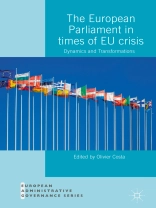This book assesses the many changes that have occurred within the European Parliament and in its external relations since the Lisbon treaty (2009) and the last European elections (2014). It is undoubtedly the institution that has evolved the most since the 1950s. Despite the many crises experienced by European integration in the last years, the Parliament is still undergoing important changes in its formal competences, its influence on policy-making, its relations with other EU institutions, its internal organisation and its internal political dynamics. Every contribution deals with the most recent aspects of these evolutions and addresses overlooked topics, providing an overview of the current state of play which challenges the mainstream intergovernmental approach of the EU.
This project results from research conducted at the Department of European Political and Governance Studies of the College of Europe. Individual research of several policy analysts of the European Parliamentary Research Service (EPRS) have contributed to this endeavour.
Содержание
1 Parliamentary oversight: Challenges facing classic scrutiny instruments and the emergence of new forms of ‘steering’ scrutiny. Eva-Maria Poptcheva.- 2 The European Parliament and the European Council. A shift in the balance of power? Wolfgang Wessels, Johannes Müller Gomez and Johannes Wolters.- 3 The CJEU and the Parliament’s powers since Lisbon. Judicial support to representative democracy? Sabine Saurugger and Fabien Terpan.- 4 The relationship between the Committee of the Regions and the European Parliament: an evolving relationship? François Decoster, Jennifer Rousselle and Vincent Delhomme.- 5 Taming Trilogues – The EU’s Law-Making Process in a Comparative Perspective. Justin Greenwood and Christilla Roederer-Rynning.- 6 The European Parliament and EU secondary legislation: Improved Scrutiny Practices and Upstream Involvement for Delegated Acts and Implementing Acts. Vicky Marissen.- 7 Out of balance? Practical experience with quasi-legislative Delegated Acts 2009-2017. Michael Kaeding.- 8 The European Parliament’s contribution to the EU Budget: a power game. Anne Vitrey and Frederik Mesdag.- 9 The European Parliament and Civil Society. Amandine Crespy and Louisa Parks.- 10 Parliamentary questions and representation of territorial interest in the EP. Nathalie Brack and Olivier Costa.- 11 The arduous way towards a uniform electoral system for the European Parliament. Rudolf Hrbek.- 12 Euroscepticism at the EP Elections in 2014: A Reflection of the Different Patterns of Opposition to the EU? Birte Wassenberg.- 13 Migration Policy Debates in the European Parliament. Does the Mainstream Right stand its Ground? Brice Cristoforetti and Lara Querton.- 14 Possible Future European Union Party Political Systems. Martin Westlake.- 15 Reforming the European Parliament’s Monetary and Economic Dialogues: Creating Accountability Through a Eurozone Oversight Subcommittee. Dermot Hodson and Michele Chang.- 16 The European Parliament and the energy poverty: Such a long way to develop a distinctive voice in the Energy Union. Frédérique Berrod, Louis Navé and Samuel Verschraegen.- 17 Parliamentary Diplomacy: Democracy support at the European Parliament. Beatrix Immenkamp and Naja Bentzen.- 18 The European Parliament in Security and Defence: The Parliamentary Contribution to the European Defence Union. Elena Lazarou.- 19 The European Parliament’s role in monitoring the implementation of EU trade policy Laura Puccio and Roderick Harte.
Об авторе
Olivier Costa is Research Professor at the CNRS, Bordeaux, France and Director of European Political and Governance Studies at the College of Europe, Bruges, Belgium. He is Co-Director of the European Jean Monnet Centre of Excellence of Aquitaine. His research interests include EU institutions and policies, European Parliament, French Parliament and comparative legislative politics.












